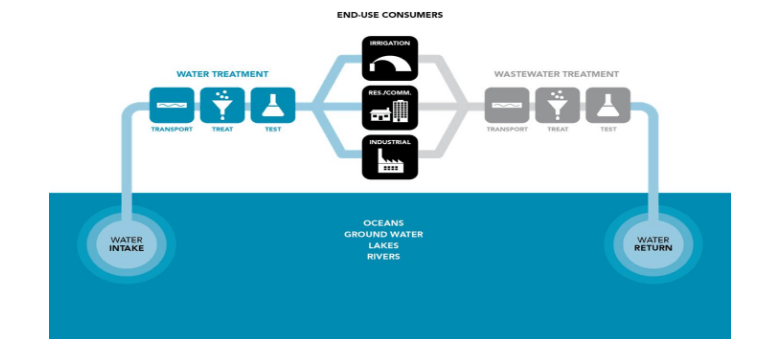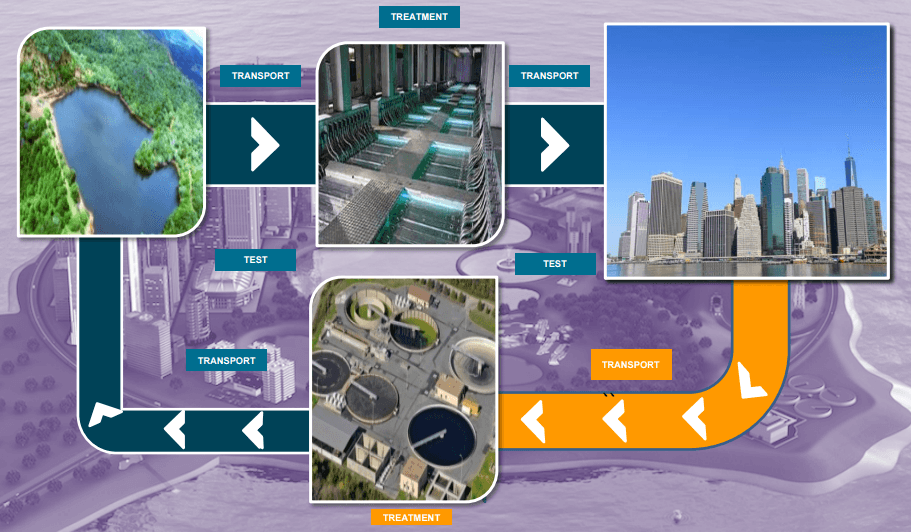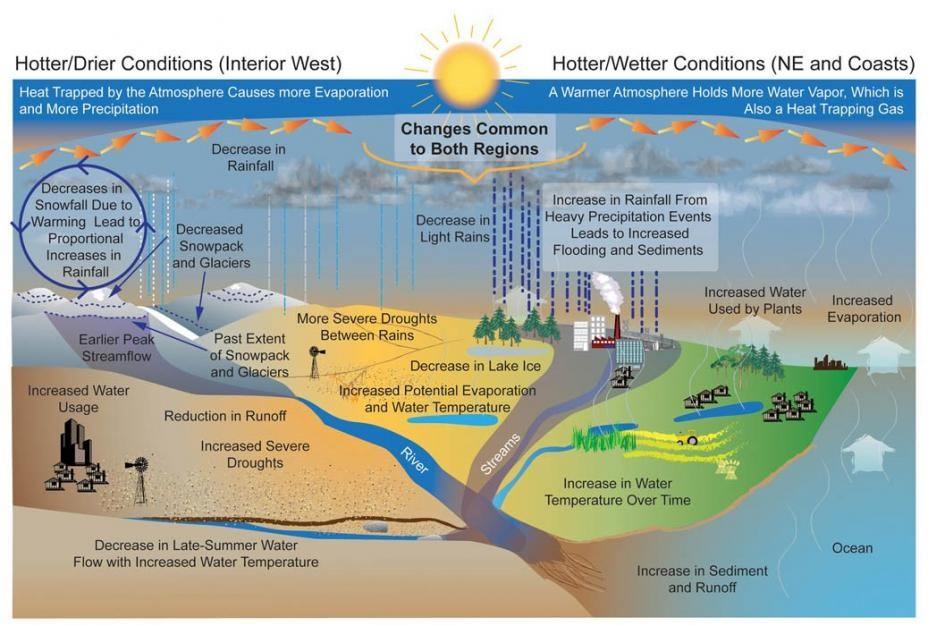Water: Our World’s Most Valuable Resource!

Xylem is public company and a global leader in providing advanced solutions for the water industry.
Xylem is public company and a global leader in providing advanced solutions for the water industry. Xylem plays a critical role in what it defines as the “cycle of water” (Xylem 5). [i] Many of us take tap or shower water for granted, but the process behind providing clean usable water is quite complex and requires serious engineering. The two charts pasted below are from Xylem’s 10-K and investor presentation. They provide an illustrative overview of “the cycle of water” that Xylem facilitates (Xylem 5). [ii]


Xylem has two operating segments which address different aspects of the process flow diagram outlined above. Its “Water Infrastructure” segment focuses on the (1) transport (2) treatment, and (3) testing phases of the water cycle (Xylem 7).[iii] Products in this segment include pumps, filtration systems, disinfection systems, biological treatment equipment, test equipment, and monitoring controls. Xylem’s “Applied Water” segment deals with (1) building services, (2) industrial water needs, and (3) irrigation (Xylem 7).[iv] Key products in this segment include: pumps, valves, heat exchangers, monitoring controls, and dispensing systems (Xylem 7).[v]
Xylems solutions play a critical role in today’s water infrastructure. The company is hyper focused on water sustainability (its mission statement is “Let’s Solve Water”) and will need to continue to evolve to meet an ever-increasing global demand for usable water (Briefing 1).[vi] Xylem estimates that its total addressable market is c. $37bn out of a c. $550bn global water industry (Xylem 4).[vii] Climate change will have a major impact on Xylems business model and is one of several structural trends that should help generate long-term growth for the business. This growth is being fueled by a combination of factors including: outdated water infrastructure, a growing population, urbanization, and increased environmental regulations. Global warming and climate change will only serve to amplify the impact of these trends.
Studies have shown that minimal increases in temperature can have a sizable impact on weather patterns and our global climate. According to the Intergovernmental Panel on Climate Change or “IPCC”, climate change will have a serious impact on our weather systems and water supply going forward. Increased temperatures have changed precipitation patterns which have resulted in more severe weather occurrences in specific locations.[viii] The graphic below comes from the IPCC’s 2014 Synthesis Report on Climate Change. As temperatures increase, arid regions will experience more severe droughts and wet climates will experience heavy increases in precipitation.
![Source: IPCC, 2014: Climate Change 2014: Synthesis Report. Contribution of Working Groups I, II and III to the Fifth Assessment Report of the Intergovernmental Panel on Climate Change [Core Writing Team, R.K. Pachauri and L.A. Meyer (eds.)]. IPCC, Geneva, Switzerland, 151 pp.](https://d3.harvard.edu/platform-rctom/wp-content/uploads/sites/4/2016/11/IPCC-Earth-Heating-up.png)
While droughts obviously deplete our freshwater supply, floods can also have an equally negative impact. Increased flooding typically results in saltwater from the ocean contaminating fresh water supplies such as lakes, ponds, and rivers. Flooding can also ruin groundwater supplies as saltwater penetrates through the Earth’s surface. Locations like South Florida that sit at or below sea level are highly exposed to this threat. Last, but not least increased temperatures allow for diseases to grow and thrive in freshwater resources that were previously kept clean by cold temperatures.

So, is there any hope for all of us who depend on freshwater to survive and, if so, what does this have to do with Xylem? The answer to the first question is yes! First, we as humans need to reduce our anthropogenic CO2 emissions. Since it may take us a long time to do that, companies like Xylem are making it their mission to promote water sustainability and, in doing so, provide society with clean, usable water. With respect to its operations, Xylem needs to continue to engineer efficient ways for us to conserve and reuse our water supply. Roughly 40% of Xylem’s PP&E sits in the US and Europe (Xylem 9).[ix] As the water supply becomes more and more constrained, emerging markets will desperately need Xylem’s solutions and Xylem should get ready to expand into these regions. But wait, there’s more! In August, 2016, Xylem acquired Sensus, a smart meter technology companies whose devices can save companies and governments billions of dollars each year with monitoring systems. This acquisition will further help Xylem pursue its mission re: water sustainability as it will be able to help its customers better monitor and conserve water usage via the Sensus’ smart meter platform. The value behind water conservation is real! I’ll end this blog with an encouraging graphic from the U.S. Global Change Research Program that shows how freshwater withdrawals in the U.S. have remained relatively flat despite an ever-increasing population. As our freshwater supply becomes increasingly limited, we need to focus on water conservation. Fortunately companies like Xylem and Sensus are around to help us do that!
Word count: 753
________________________________________________________________________________
[i] Xylem Inc., 2015 Annual Report, https://www.sec.gov/Archives/edgar/Xylem, accessed November 2016.
[ii] 2015 Annual Report
[iii] 2015 Annual Report
[iv] 2015 Annual Report
[v] 2015 Annual Report
[vi] Xylem Inc., “Investor Briefing November 2016,” PowerPoint presentation, November 2016.
[vii] 2015 Annual Report
[viii] IPCC, 2014: Climate Change 2014: Synthesis Report. Contribution of Working Groups I, II and III to the Fifth Assessment Report of the Intergovernmental Panel on Climate Change [Core Writing Team, R.K. Pachauri and L.A. Meyer (eds.)]. IPCC, Geneva, Switzerland, 151 pp.
[ix] 2015 Annual Report



Cool post! I assume most of Xylem’s customers are municipalities that control the water infrastructure? I wonder to what extent they have already started to upgrade infrastructure to make the water system more resilient. It sounds like they probably have invested in upgrades of some sort since you said that the amount of freshwater use has actually remained stable despite a growing population. I expect that making significant upgrades to the water system is a multi-year endeavor.
Great post. I wonder whether the company has done any work with energy companies – e.g., mining or oil & gas companies? Water conservation and recycling is a huge consideration for those businesses. Energy companies, particularly those involved in hydraulic fracturing, have made a push over the past few years to using more recycled water in an attempt to create more sustainable practices. Water is a key input for many of these businesses, and often times they operate in locations where they can’t easily obtain water.
Thanks for sharing about how Xylem is involved in the water infrastructure, the diagram was helpful! I agree that the infrastructure to transport, treat, and test water is a significant endeavor, not only for residential/commercial uses, but also for irrigation and industry. This is likely to be a growing business for companies like Xylem, because according to the OECD water demand will increase by 50% globally by 2050, in large part due to industrial and agricultural demands [1]. As a result, Xylem is positioned to address this growing need that will only be exacerbated by climate change. I also agree with your point that this technology could be expanded to emerging markets that will be more significantly at risk for water issues. The World Resources Institute has an interesting visual through their Aqueduct project that visualizes a ranking of countries with projected water stress in 2040 that could guide where this technology would be most impactful [2].
[1] Water: The Challenges for Business. PWC. Accessed from: http://www.pwc.com/gx/en/services/sustainability/water/challenges.html.
[2] Aqueduct Projected Water Stress Country Rankings. World Resources Institute. Accessed from: http://www.wri.org/resources/data-sets/aqueduct-projected-water-stress-country-rankings.